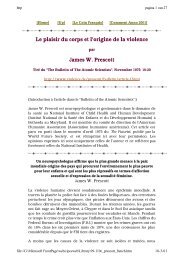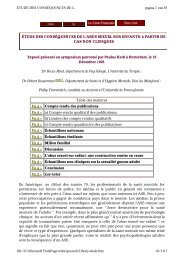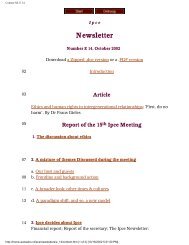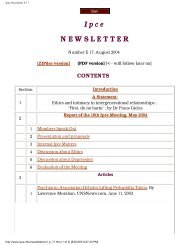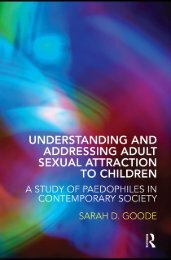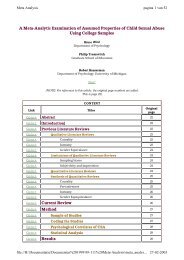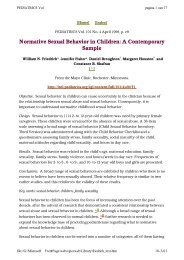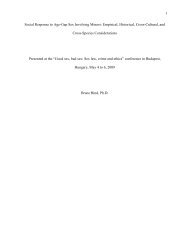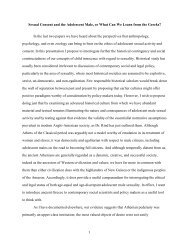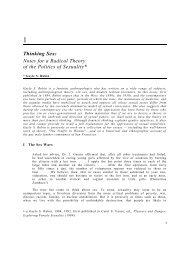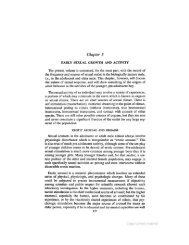Infant and Child Sexuality: A Sociological Perspective - Ipce
Infant and Child Sexuality: A Sociological Perspective - Ipce
Infant and Child Sexuality: A Sociological Perspective - Ipce
You also want an ePaper? Increase the reach of your titles
YUMPU automatically turns print PDFs into web optimized ePapers that Google loves.
e a fold of skin. I was disappointed. She then<br />
asked, “What is that?” referring to my penis. I<br />
became embarrassed <strong>and</strong> replied it was where I<br />
“tinkled,” <strong>and</strong> redressed.<br />
A feeling of blighted hope came over me.<br />
Failure of my expectations. I thought that I had<br />
been swindled. There was not much to see, <strong>and</strong><br />
what there was was partially concealed. The game<br />
ended shortly after this.<br />
It was an undermining experience to see her genitals,<br />
that is, what there was to see of them. I<br />
had expected something much more interesting to<br />
play with, for even though I knew she was built<br />
differently I didn’t know it would be that different.<br />
The young child who has been told of what male <strong>and</strong> female attributes<br />
are involved in producing a baby still remains perplexed as to<br />
the manner in which the elements come together. (Conn, 1948). Even<br />
children who have observed parental coitus do not find this sufficient<br />
to create an articulated sexual image of the mother or father, whatever<br />
else it might do. (Gagnon, 1965).<br />
This is not because of indifference toward adults <strong>and</strong> their concerns.<br />
Up to the age of two the infant seems unaware of his parents as<br />
persons with interests <strong>and</strong> feelings of their own which are unrelated to<br />
their love <strong>and</strong> care of him. He has an egocentric <strong>and</strong> exaggerated view<br />
of his own importance. But this egocentricity changes <strong>and</strong> at about age<br />
three he begins to realize that his parents are not only the providers<br />
of his creature comforts but also have concerns, pleasures, <strong>and</strong> dreams<br />
of their own. (Peller, 1965). The concerns of adults are close to the<br />
child <strong>and</strong> meaningful to him in his own terms.<br />
By age five children are easily aware of most of the non-coital<br />
content of the marital relationship--cooking, cleaning house, caring<br />
for children, going to work. They practice many of the marriage <strong>and</strong><br />
family roles through “playing house.”<br />
One of my (boy) closest friends was a young girl<br />
named Jean. She was one year younger than I. We<br />
often played together, frequently at “house.” We<br />
acted the roles of man <strong>and</strong> wife as we perceived<br />
them from our parents. I was most often the<br />
father, involved in a job at an office that kept<br />
me away from my family. The wife cared for the<br />
home. Occasionally, when other neighborhood<br />
children joined us, an older boy would take the<br />
role of the father, <strong>and</strong> I would then become a<br />
son, playing the roles more familiar to me; the<br />
loving son, the diffident, pouty child, <strong>and</strong> hellion.<br />
It is safe to conclude that I experienced<br />
an imaginary marriage in my early childhood. I<br />
tried to play the various roles involved as<br />
realistically as possible.<br />
They also have a good idea of the field of eligibles from which<br />
33



